人教新目标版英语八年级上册 Unit 2 How often do you exercise Section B (1a~1e) 课件(共15张PPT)
文档属性
| 名称 | 人教新目标版英语八年级上册 Unit 2 How often do you exercise Section B (1a~1e) 课件(共15张PPT) | 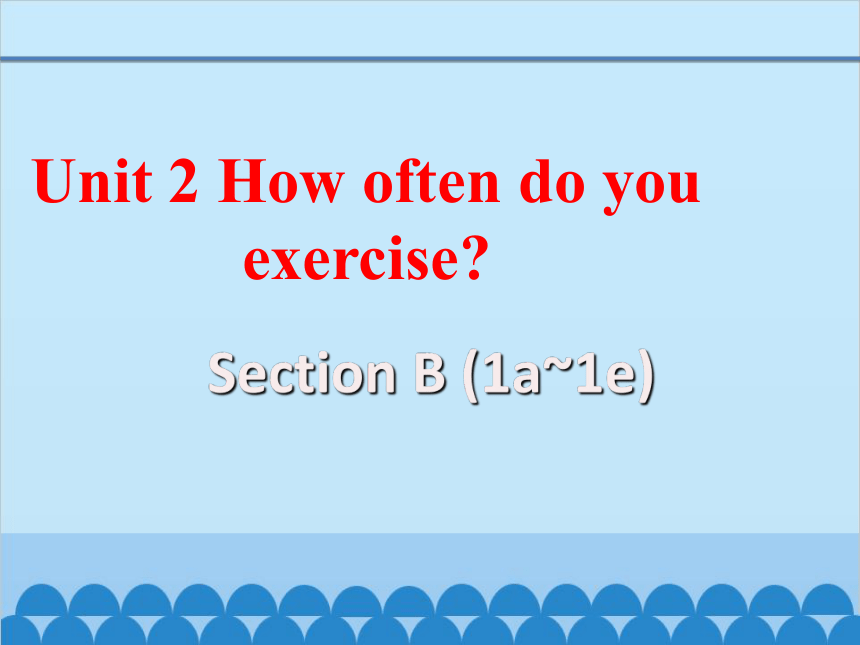 | |
| 格式 | ppt | ||
| 文件大小 | 1.4MB | ||
| 资源类型 | 教案 | ||
| 版本资源 | 人教新目标(Go for it)版 | ||
| 科目 | 英语 | ||
| 更新时间 | 2023-07-09 11:13:18 | ||
图片预览

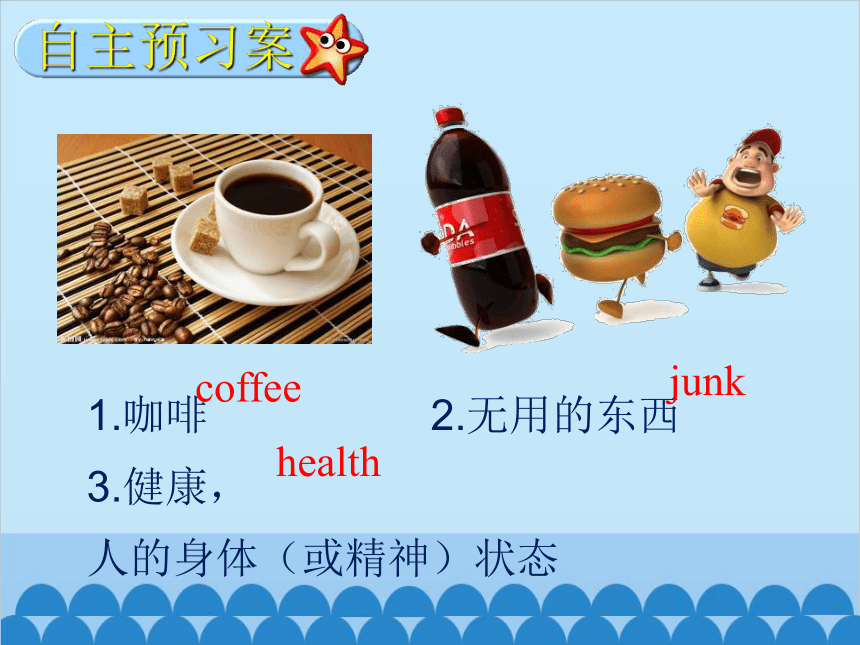
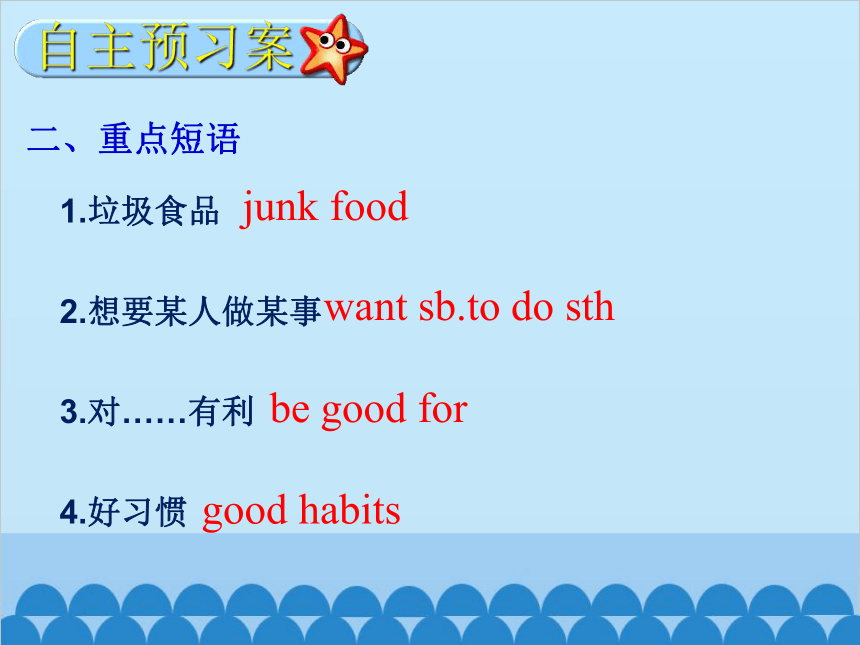
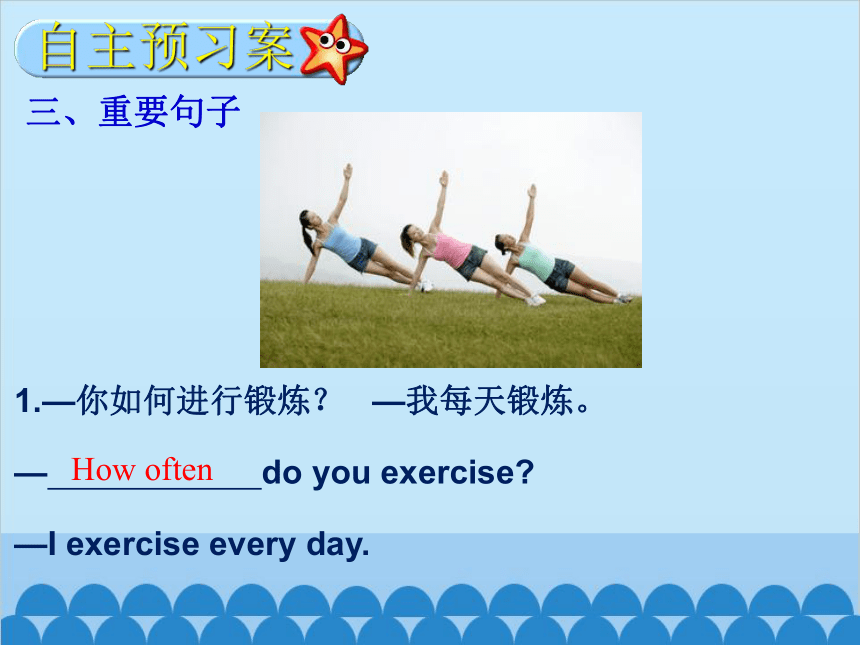

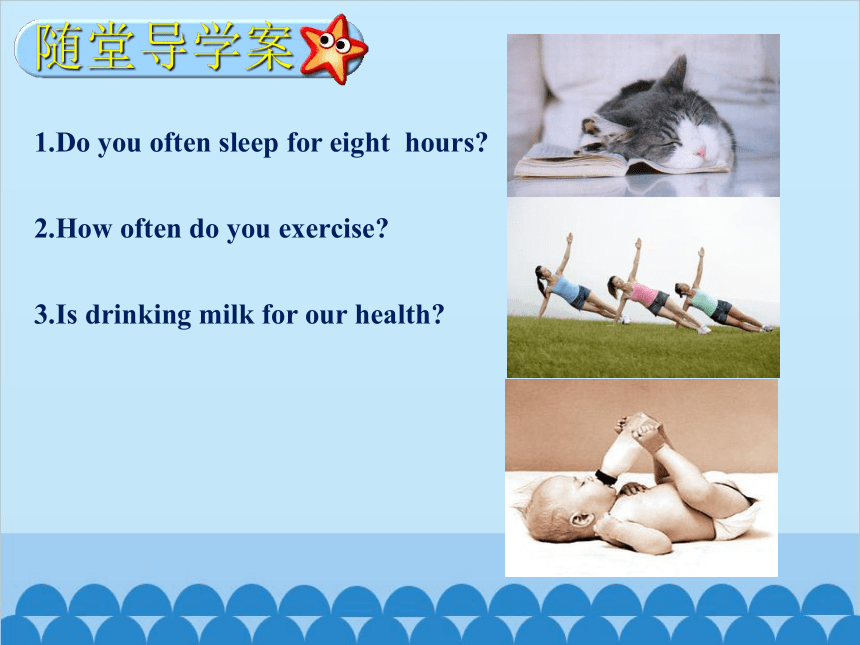
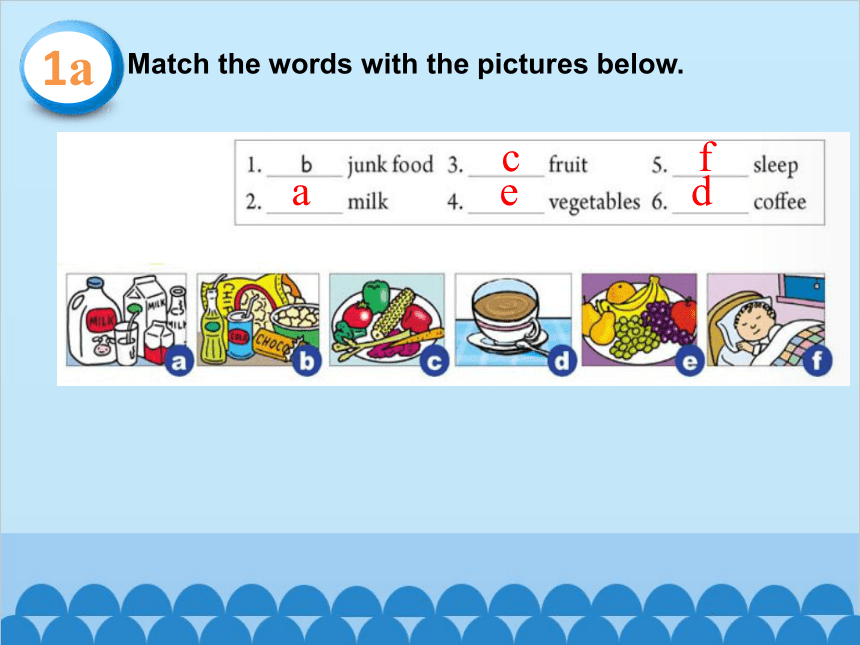
文档简介
(共15张PPT)
Unit 2 How often do you exercise
Section B (1a~1e)
自主预习案
1.咖啡 2.无用的东西
3.健康,
人的身体(或精神)状态
coffee
junk
health
自主预习案
1.垃圾食品
2.想要某人做某事
3.对……有利
4.好习惯
junk food
二、重点短语
want sb.to do sth
be good for
good habits
自主预习案
三、重要句子
1.—你如何进行锻炼? —我每天锻炼。
— do you exercise
—I exercise every day.
How often
自主预习案
三、重要句子
2.你每晚睡几个小时?
do you sleep every night
How many hours
随堂导学案
1.Do you often sleep for eight hours
2.How often do you exercise
3.Is drinking milk for our health
1a
Match the words with the pictures below.
a
c
e
f
d
1b
Ask and answer questions. Use the words from 1a.
1c
Listen to an interview about two people’s daily habits. Circle your answer to each questions.
Does Tina have good habits Yes. No. I don’t know.
Does Bill have good habits Yes. No. I don’t know.
1d
Listen again. Fill in the blanks in the survey.
nine
every day
every day
never
hardly ever
never
nine
every day
4 times a day
Student A is the reporter. Student B is Tina or Bill. Ask and answer question. Then change roles
1e
A: How often do you exercise
B: I exercise every day.
A: And how often do you …
Key points
1. drink
①作动词用意为“喝,饮”,其后常跟名词,如:
milk(牛奶)、coffee(咖啡)等。
②作名词时,意为“饮料,(一)杯”。如:
some drinks 一些饮料 have a drink喝一杯
eg: Our students dink milk every day.
2. health
为一个不可数名词,意为“健康”。
其形容词为healthy(健康的),其副词为healthily。
eg: Exercising is good for our health.
3. be good for
意为“对…有益,适宜于…”,其反义词组为:be bad for (对…有害)
Practice
根据汉语提示完成句子
1.我妈妈想要我喝牛奶。
My mother milk.
2.你有好习惯吗?
Do you have habits
3.—你如何吃水果?—有时吃。
—How often do —Sometimes.
wants me to drink
good
eat fruit
Homework
Thank you!
Unit 2 How often do you exercise
Section B (1a~1e)
自主预习案
1.咖啡 2.无用的东西
3.健康,
人的身体(或精神)状态
coffee
junk
health
自主预习案
1.垃圾食品
2.想要某人做某事
3.对……有利
4.好习惯
junk food
二、重点短语
want sb.to do sth
be good for
good habits
自主预习案
三、重要句子
1.—你如何进行锻炼? —我每天锻炼。
— do you exercise
—I exercise every day.
How often
自主预习案
三、重要句子
2.你每晚睡几个小时?
do you sleep every night
How many hours
随堂导学案
1.Do you often sleep for eight hours
2.How often do you exercise
3.Is drinking milk for our health
1a
Match the words with the pictures below.
a
c
e
f
d
1b
Ask and answer questions. Use the words from 1a.
1c
Listen to an interview about two people’s daily habits. Circle your answer to each questions.
Does Tina have good habits Yes. No. I don’t know.
Does Bill have good habits Yes. No. I don’t know.
1d
Listen again. Fill in the blanks in the survey.
nine
every day
every day
never
hardly ever
never
nine
every day
4 times a day
Student A is the reporter. Student B is Tina or Bill. Ask and answer question. Then change roles
1e
A: How often do you exercise
B: I exercise every day.
A: And how often do you …
Key points
1. drink
①作动词用意为“喝,饮”,其后常跟名词,如:
milk(牛奶)、coffee(咖啡)等。
②作名词时,意为“饮料,(一)杯”。如:
some drinks 一些饮料 have a drink喝一杯
eg: Our students dink milk every day.
2. health
为一个不可数名词,意为“健康”。
其形容词为healthy(健康的),其副词为healthily。
eg: Exercising is good for our health.
3. be good for
意为“对…有益,适宜于…”,其反义词组为:be bad for (对…有害)
Practice
根据汉语提示完成句子
1.我妈妈想要我喝牛奶。
My mother milk.
2.你有好习惯吗?
Do you have habits
3.—你如何吃水果?—有时吃。
—How often do —Sometimes.
wants me to drink
good
eat fruit
Homework
Thank you!
同课章节目录
- Unit 1 Where did you go on vacation?
- Section A
- Section B
- Unit 2 How often do you exercise?
- Section A
- Section B
- Unit 3 I'm more outgoing than my sister.
- Section A
- Section B
- Unit 4 What's the best movie theater?
- Section A
- Section B
- Unit 5 Do you want to watch a game show?
- Section A
- Section B
- Unit 6 I'm going to study computer science.
- Section A
- Section B
- Unit 7 Will people have robots?
- Section A
- Section B
- Unit 8 How do you make a banana milk shake?
- Section A
- Section B
- Unit 9 Can you come to my party?
- Section A
- Section B
- Unit 10 If you go to the party, you'll have a grea
- Section A
- Section B
